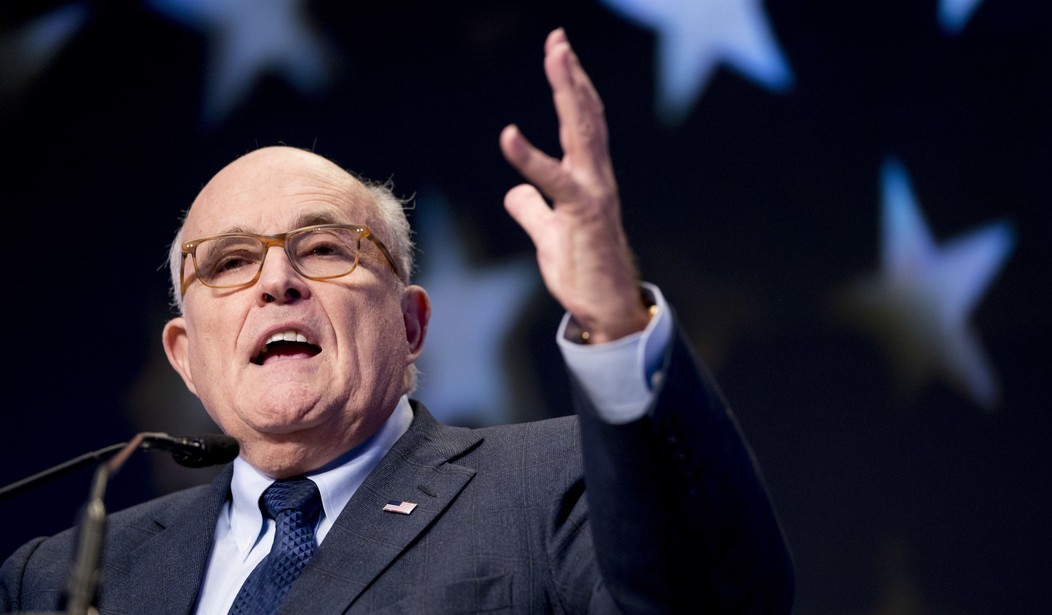With the Trump Administration it often is difficult to determine whether a bizarre public statement is a clever smokescreen, or if the proponent actually believes what he or she is saying. While Trump is a true master at manipulating his enemies, his advisors are not always as deft.
Take, for example, the recent proclamation by Trump’s latest Legal Eagle, Rudy Giuliani, asserting the president possesses the power to self-pardon.
Considering all that has been happening in Washington these days, one might conclude that such a statement serves as an intentionally crafted distraction by Trump’s attorneys, thrown to the media like chum for sharks in order to keep them thrashing about. On pause, however, and again taking into account other recent statements by various legal pundits, it might be that Giuliani has come to actually believe such nonsequiturshave, in today’s world, become true.
Contrary to Giuliani’s novel theory, which is like a “Magic Mirror” into which a president speaks and is granted a pardon, such fantastical pardon powers do not actually exist. And, if Giuliani were the lawyer he fancies himself to be, perhaps he would realize the reason this power does not exist in law is because the law -- going back all the way to the Federalist Papers-- makes such powers legally and factually irrelevant.
In Federalist No. 69, Alexander Hamilton lays out the two methods for dealing with corrupt presidents. The first is electoral, with Hamilton stating the president could be re-elected “as often as the people of the United States shall think him worthy of their confidence.” The second method is impeachment. Here, Hamilton declares the President subject “to be impeached, tried, and, upon conviction…removed from office”; adding that the president “would afterwards be liable to prosecution and punishment in the ordinary course of law.”
Recommended
In case Rudy missed it, the operative word used by Hamilton, as regards the issue of impeachment and prosecution, is “afterwards.” First comes impeachment. Then a trial and conviction by the Senate. And, only after these proceedings, when the president is removed from office and no longer occupying a seat of power, can he be prosecuted for his crimes.
Though hinging on a single word, this is a crucial distinction and one essential for the smooth operation of the Republic. If a president couldbe indicted and prosecuted while in office, there is nothing to stop rogue U.S. Attorneys, or in the case of President Trump, out-of-control special prosecutors, from bogging down the Executive in non-stop litigation, frivolous or otherwise. Such procedural protections would also logically extend to the fruits of prosecution for the same reasons, such as refusing subpoena or deposition requests, or generally cooperating with investigators (as Giuliani, to his credit, has previously mentioned).
Though not tested to the fullest extent by former President Bill Clinton during the impeachment investigation against him, Clinton regularly defied Independent Counsel Kenneth Starr. Had Clinton’s actions been tested in court, I suspect the former president would have prevailed for the reasons outlined here.
All of this is not to say that Trump is wrong in declaring the vast extent of his pardon powers. Courts have consistently deemed absolute the president’s power to pardon those who have committed federal crimes. We were reminded of this in 2001, when challenges were unsuccessful against Clinton’s pardoning of his brother Roger and corrupt financier Marc Rich on the last day of his presidency.
The far better track on which Trump’s lawyers should be travelling (and the President himself) is to argue that he would never, ever find himself in a place where he would need to invoke a self-pardon. Arguing otherwise implies he would have been successfully prosecuted for a crime – a situation which can only occur after he is out of office.
Periodically, and depending largely on which party’s representative resides at 1600 Pennsylvania Avenue, both major political parties have advocated for increasingly robust powers for the person who occupies that office. Most recently, a legal memorandum prepared by Trump’s legal coterie reportedly describes the office as “sacred.” In reality, the president is neither deity nor absolute monarch. As a matter of constitutional history and law, however, he is insulated from the vagaries of prosecutorial politics. President Trump does not need legal fairytales spun by those like Giuliani to protect him; the Founding Fathers already did a fine job in that regard.
Studying a copy of the Federalist Papers would be time far better spent by Trump’s legal team than glancing at Grimm’s Fairtytales.

























Join the conversation as a VIP Member